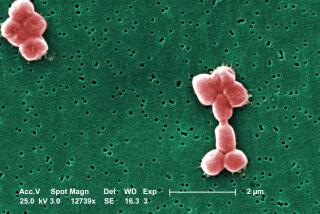Drug OKd to Fight Off Resistant Infections
- Share via
WASHINGTON — The Food and Drug Administration, mindful of the growing public health threat of drug-resistant bacteria, on Tuesday approved the first alternative in three decades to the one antibiotic that works when standard drugs do not.
The new drug, Synercid, is the first approved to treat infections that fail to respond to vancomycin, making it an important weapon in the war against infections.
Health officials estimated that there are as many as 20,000 cases of these resistant infections annually. While the numbers may seem small, many health officials view them as a potentially deadly harbinger of worse to come.
“We’ve gone from one case in 1989 to this,” said Dr. Sandra Kweder, an FDA official who is an infectious diseases expert. “So this is a significant approval. Patients suffering from these highly resistant infections had no alternative and many of them died.”
In fact, the agency licensed the drug under a special regulatory mechanism designed to speed important new compounds for life-threatening conditions into public use.
For several years--even though the drug was still considered experimental--the agency has permitted its use in emergency situations for patients near death.
The drug, made by Rhone-Poulenc Rorer, a French company with U.S. headquarters in Collegeville, Pa., was approved to treat Enterococcus faecium, a drug-resistant bacterium that afflicts cancer patients undergoing chemotherapy, transplant recipients and others whose immune systems have become weak. It also can be a problem for post-surgical patients, the elderly and young children.
“It is a common complication for children undergoing chemotherapy treatment for leukemia--the chemotherapy is successful, but then these children often develop vancomycin-resistant infections,” said John La Montagne, deputy director of the National Institute of Allergy and Infectious Diseases. “When they get [it], there’s not much that can be done.”
Synercid is the first drug in a new class of antibiotics that combines other drugs--in this case quinupristin and dalfopristin--to deliver a multi-pronged attack on the organism.
The combination, which is 16 times more powerful than either drug alone, destroys the bacterium’s ability to manufacture new proteins. When this happens, bacterial cells are inactivated or die.
Bacteria develop resistance to antibiotics because they evolve so quickly. They multiply rapidly--two or three times an hour. If a few bacteria develop genes that can protect them from antibiotics, those few resistant microbes can become millions overnight.
Some hospitals--once infected with the resistant bacteria--can find it extremely difficult to eradicate, said Dr. Ron Jones, a pathologist at the University of Iowa College of Medicine. Patients who harbor the infection, which lives in the gastrointestinal tract, can expose others by contaminating hospital floors and surfaces, despite infection control procedures, he said.
“The vast majority of medical centers do not have this problem,” he said. “But, for those that do, this drug will be a godsend.”
Because many resistant bacteria develop as a result of overuse--or indiscriminate use--of antibiotics, Kweder said that medical centers and physicians will be cautioned to preserve use of the new drug only in cases where the organism is tested and determined to be vancomycin-resistant. While “the FDA has not imposed specific restrictions, the company has assured us that it is committed to reserving its use for the sicker patients to maintain its value,” she added.






